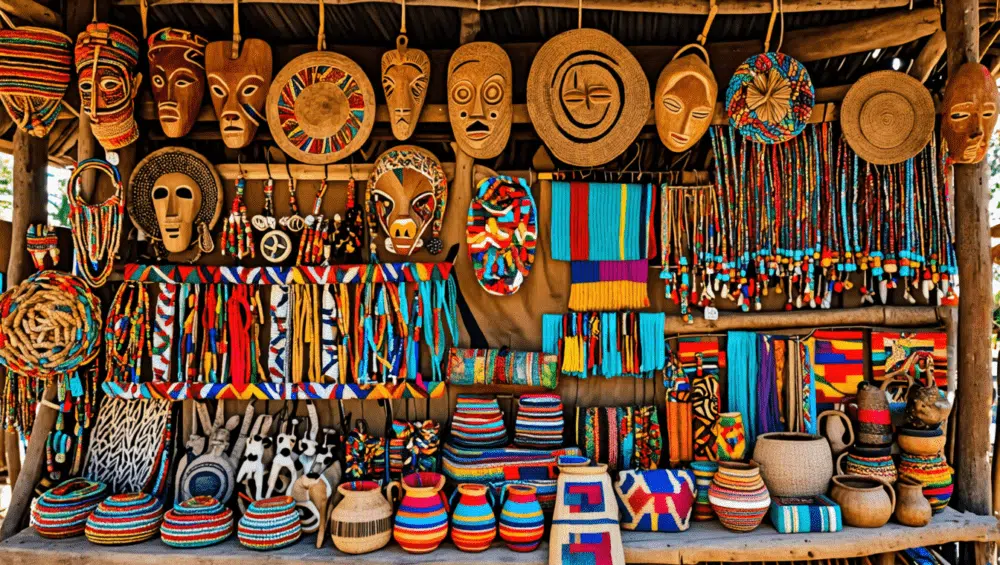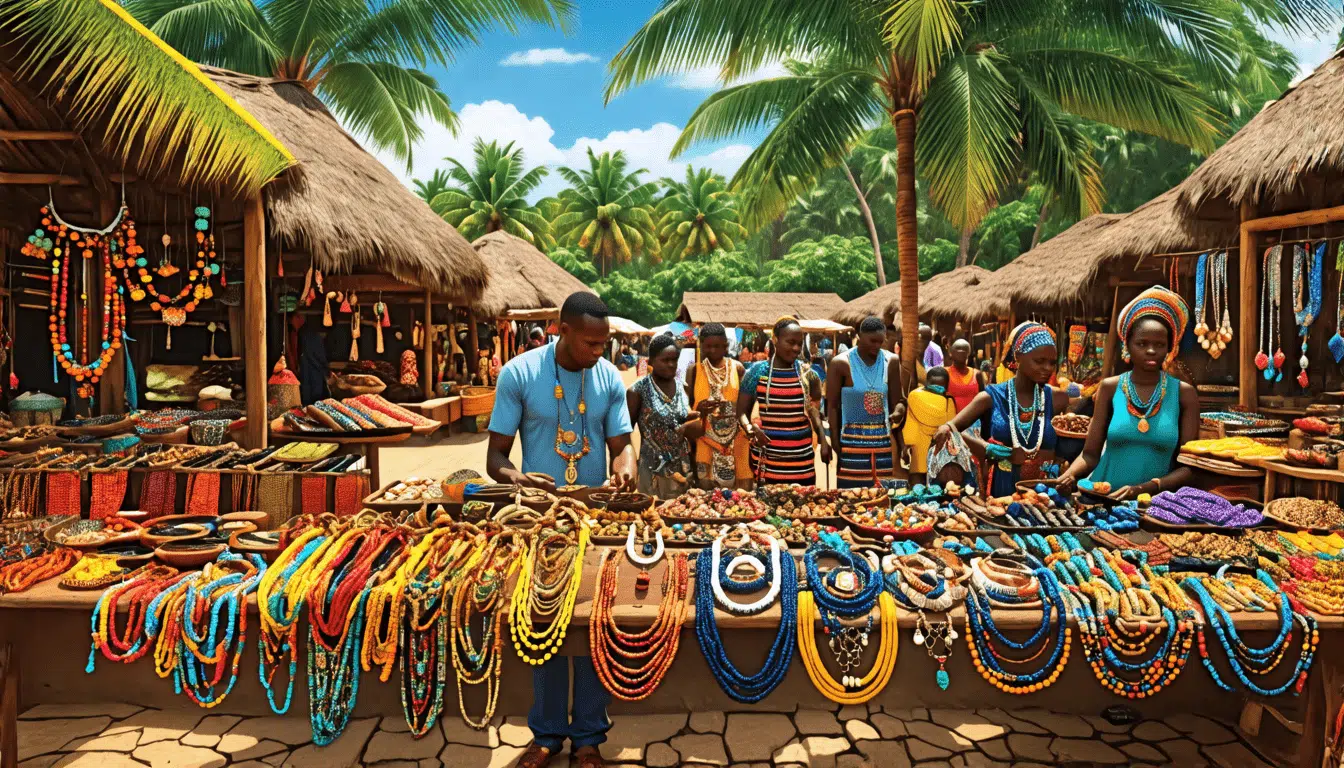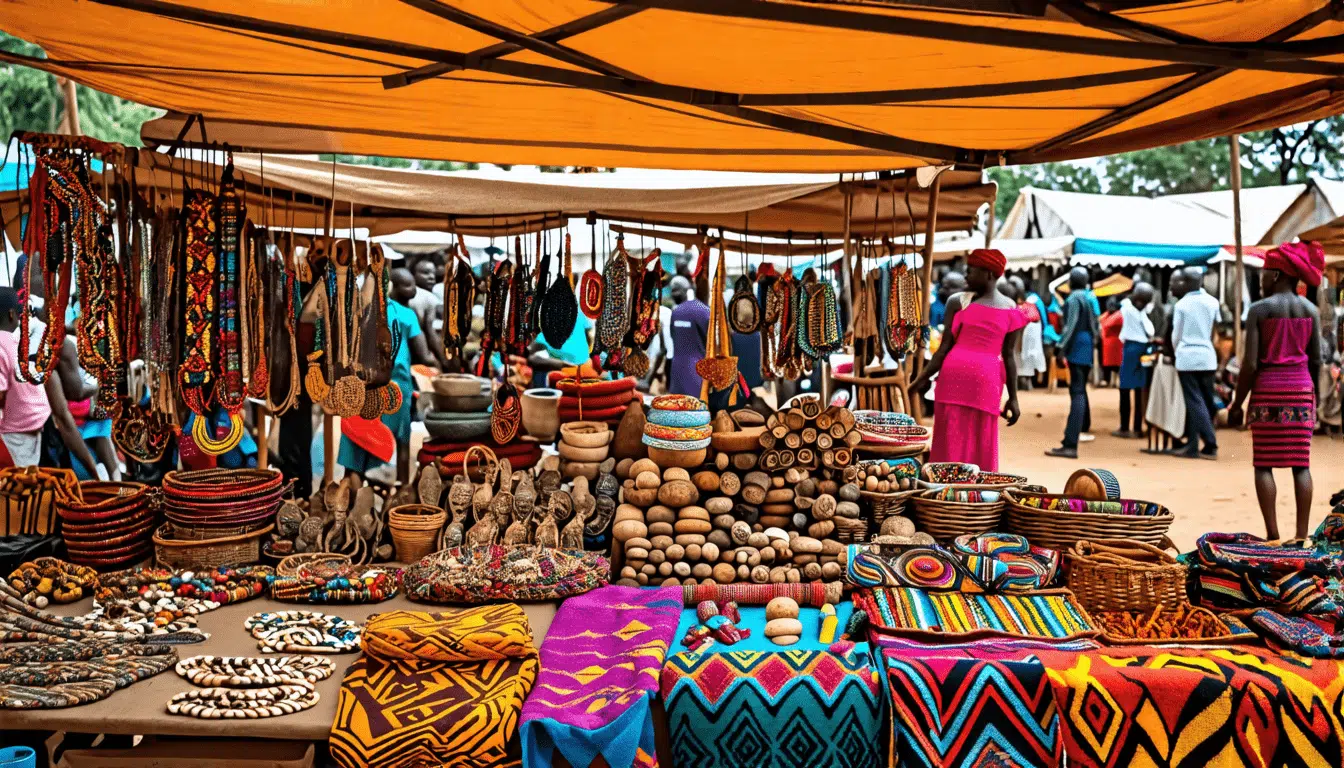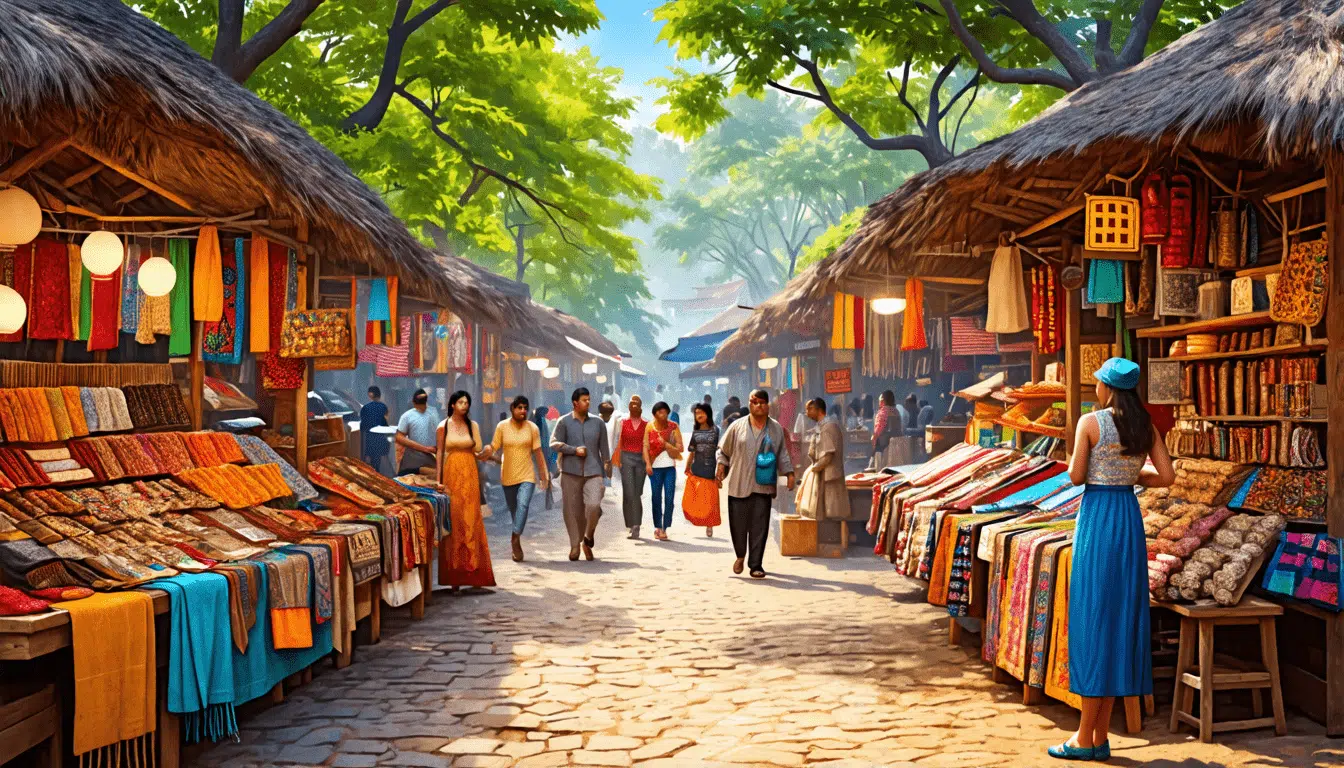Introduction to Handcrafted Souvenirs in Africa
Imagine this: You’re on a thrilling African safari, your camera’s memory card is brimming with snapshots of majestic lions and expansive savannahs, and you’re ready to bring a piece of this unforgettable journey back home. What better way to do that than with unique handcrafted souvenirs? Africa’s rich cultural heritage offers an array of beautifully crafted items that not only serve as a keepsake but also support local artisans.
Buying souvenirs isn’t just about having something to display on your mantelpiece. It’s about connecting with the stories and traditions of the places you visit. When you purchase directly from artisans, you’re not just buying a product; you’re investing in the livelihood and preserving the craft of someone who has dedicated their life to perfecting it.
Picture walking through a bustling market, surrounded by vibrant colors and the welcoming smiles of vendors. The air is filled with the rhythmic sounds of crafting tools at work and the tantalizing aroma of street food. Not only do souvenirs make perfect mementoes, but they also create lasting memories of your adventure-packed safari. So, buying souvenirs becomes an integral part of your journey, a chance to carry a piece of that cultural richness with you.
Introduction to Handcrafted Souvenirs in Africa
Brief Overview of Africa’s Rich Cultural Heritage
Imagine standing in a bustling market, the air filled with the sounds of haggling, laughter, and the hum of a vibrant community. Africa is a treasure trove of cultural diversity, with each of its 54 countries offering a unique tapestry of traditions, languages, and artistic expressions. From the intricate beadwork of the Maasai in Kenya to the bright, geometric patterns of West African textiles, the continent is a living museum of artistic heritage.
Man, I remember my first trip to an African market like it was yesterday. The colorful stalls, the smell of spicy street food wafting through the air—it’s an experience that stays with you. And let’s not even get started on the sheer variety of handmade crafts you can find. These aren’t just items; they’re stories, traditions, and a slice of history that artisans pass down through generations.
Importance of Supporting Local Artisans
Now, why should we care about buying these handcrafted treasures? Simply put, supporting local artisans is crucial. Think of it as a way to directly invest in the lives of people who pour their soul into creating these beautiful items. When you buy a handwoven basket or an intricately carved wooden statue, you’re not just getting a beautiful souvenir. You’re helping sustain a family, preserve cultural practices, and keep traditional skills alive.
Remember Sam, the guy I met in Nigeria? He crafted the most amazing wooden masks. When tourists buy his masks, they’re doing far more than just adding to their home décor—they’re helping Sam provide for his family and empowering him to continue his craft.
Purpose of Buying Souvenirs on Safari Trips
A safari experience is already packed with adrenaline-pumping excitement and unforgettable moments. But the perfect way to capture these memories, aside from your digital photos, is through handcrafted souvenirs. Not only do these items serve as a tangible memory of your adventure, but they also allow you to bring a piece of the place, its people, and its stories back home with you.
Have you ever looked at a handcrafted item on your mantle and had a flood of memories from your trip rush back? I have a necklace I bought from a local market in Tanzania, and every time I see it, I’m transported back to that moment—chatting with the friendly vendor, hearing the call of nearby wildlife, feeling the African sun on my skin. Souvenirs connect you to your journey long after you’ve returned home.
So, why do we place such importance on souvenirs? It’s simple—they are memories made tangible. And when these souvenirs are handcrafted, they’re not just any memory. They’re a piece of the cultural tapestry, woven with stories, skill, and soul. What better way to honor your safari experience than by supporting the local artisans who make it richer?
Unique Handcrafted Souvenirs to Consider
Traditional African Jewelry
When you think of African jewelry, what comes to mind? Vibrant colors, intricate designs, and, of course, a story behind every piece. If you’ve ever been captivated by a beautiful necklace or a stunning pair of earrings, you’re not alone. African jewelry is not just an accessory; it’s a piece of the continent’s soul.
Many traditional African jewelry pieces are made from materials like beads, metals, and even natural elements like bones and stones. The beadwork, in particular, is a popular type, often seen in the form of colorful, intricate beaded necklaces and bracelets. In many cultures across Africa, beads hold great significance. For instance, the Maasai people of Kenya and Tanzania use beads to denote social status, age, and even marital status. It’s like wearing your life story, one bead at a time.
Metalwork is another fascinating aspect. Imagine wearing an intricately designed bracelet or necklace made from brass or copper, carrying with it centuries-old techniques. These pieces often feature symbols and motifs that hold cultural and spiritual significance. So, next time you see a piece of traditional African jewelry, remember, it’s more than just an accessory; it’s a piece of history.
Handwoven Textiles and Baskets
Have you ever wrapped yourself in a beautifully patterned African fabric? The vibrant colors and detailed designs can transform even the dullest of days. Handwoven textiles and baskets are some of the most exquisite souvenirs you can bring back from your African safari.
African weavers use a variety of techniques, each region boasting its unique style. For example, the kente cloth from Ghana is famous for its bright, geometric patterns. Each color and pattern in the kente cloth tells a story, representing concepts like peace, love, and strength. Imagine draping your home in stories and meanings from far-off lands – quite the conversation starter, don’t you think?
Handwoven baskets are another staple. Picture a beautifully woven basket sitting in your living room, reminding you of the talented artisans from the lands of Botswana or Zimbabwe. These baskets often serve practical purposes in African homes, such as carrying crops or storing household items, but they also make for stunning decorative pieces. The intricate weaving techniques passed down through generations add a touch of Africa’s rich heritage to your home.
Sculptures and Wooden Carvings
If you’re a fan of art that tells a story, you’ll fall in love with African sculptures and wooden carvings. Ever wondered what goes into creating those detailed wooden figures? The process is nothing short of art itself.
African carvers use tools like chisels and knives to bring blocks of wood to life. They often start with a vision – maybe it’s an animal, a human figure, or an abstract design. Each stroke and each cut is deliberate, resulting in a piece that encapsulates the spirit of the subject. Popular motifs include animals like elephants, lions, and giraffes, familiar sights if you’re on a safari. These carvings are more than just decor; they are a piece of Africa’s wildlife and traditions brought into your home.
And it’s not just about the final product. The cultural significance behind these carvings can be deeply meaningful. Many tribes use specific motifs to symbolize various cultural beliefs and historical events. When you purchase one of these carvings, you’re not just buying a piece of wood – you’re acquiring a conversation piece filled with stories and cultural richness.
Pottery and Ceramics
Pottery and ceramics have a special place in African culture. Have you ever held a piece of pottery and wondered about its journey? Each pot and ceramic item tells a tale of its own.
African pottery comes in various shapes and sizes, often utilitarian but always beautiful. You’ll find pots for cooking, vessels for storing water, and decorative pieces that add a rustic charm to any space. The different regions in Africa offer unique styles of ceramics. For example, the Moroccan tagine pots are not just for cooking – they are a staple in Moroccan culinary culture.
The designs on these pottery pieces are usually not random. They often reflect cultural symbols and stories passed down through generations. Imagine owning a piece of pottery with intricate designs that might represent fertility, prosperity, or protection. It’s like having a piece of Africa’s ancient wisdom in your home.
So, next time you’re on a safari, keep an eye out for these handcrafted treasures. Each piece you’ll find is a testament to the rich cultural heritage and artisanship of Africa, waiting to share its story with you.
Regions and Markets for Authentic Souvenirs
East Africa: Kenya, Tanzania, and Uganda
When you step into the vibrant markets of East Africa, you’re greeted with a kaleidoscope of colors, sounds, and the rich aroma of local spices. Have you ever wandered through a market in Kenya and marveled at the intricate beadwork? In Nairobi’s Maasai Market, you’ll find artisans who have perfected their craft over generations, creating stunning jewelry and accessories that tell a story. These pieces aren’t just eye-catching; they’re imbued with cultural significance.
In Tanzania, the bustling markets of Dar es Salaam are treasure troves of handwoven textiles known as “Khangas”. Each piece of fabric often features bold designs and Swahili proverbs that give them a unique charm. Imagine wrapping yourself in one as a reminder of your safari adventure. Ugandan craft markets, like the ones in Kampala, offer a plethora of Ankole horn products—everything from meticulously polished utensils to elegant jewelry. Have you ever held a piece of Ankole horn polished to a mirror finish? It’s like holding a piece of the wild beauty of Uganda in your hands.
Southern Africa: South Africa, Zimbabwe, and Namibia
Southern Africa is equally rich in diverse crafts. Take South Africa, for example. The markets in Cape Town and Johannesburg are brimming with Zulu beadwork, a traditional art form that has been passed down through generations. Whether it’s vividly colored necklaces or delicate bracelets, these pieces add a dash of African flair to your wardrobe. I once bought a pair of Zulu beaded earrings at the V&A Waterfront in Cape Town, and they never fail to spark a conversation.
Zimbabwe offers some of the finest stone sculptures in the world. The Shona people are master stone carvers, and their works often depict familial bonds, daily life, and spiritual beliefs. The skill and time that goes into each piece are remarkable. If you’re in Victoria Falls, don’t miss visiting the Elephant’s Walk Shopping & Artist Village, where you can actually watch the sculptors at work. Namibia, on the other hand, is famous for its leatherwork. Have you ever felt the supple touch of handcrafted Namibian leather? The markets in Windhoek offer beautifully crafted pieces ranging from handbags to sandals that are perfect souvenirs from this rugged, beautiful land.
West Africa: Ghana, Nigeria, and Senegal
West Africa is a haven for those looking for unique, handcrafted souvenirs. Ghana is renowned for its Kente cloth, a vibrant textile woven in a variety of eye-catching patterns. The markets in Accra and Kumasi are where you can find authentic Kente cloth, often woven right before your eyes. It’s more than just fabric; it’s a symbol of Ghanaian culture and pride. The first time I visited a Kente weaving village, I was mesmerized by the rhythm of the loom and the sheer concentration of the weaver.
In Nigeria, delve into the markets of Lagos, where you’ll discover intricate brass sculptures from the Benin and Ife cultures. These pieces are steeped in history and make for truly unique souvenirs. The energy in these markets is palpable; you can feel the heartbeat of Nigeria in every stall and every transaction. Senegal is another gem, offering an array of crafts, including gorgeous woven baskets and vibrant paintings. Markets like Sandaga Market in Dakar are places where both locals and tourists converge to find the best of Senegalese craftsmanship.
Tips for Identifying Quality and Authenticity
But how do you ensure you’re getting the real deal and not a mass-produced imitation? Here’s a golden rule: Engage with the artisans themselves whenever possible. Ask them about their process, the materials they use, and the meaning behind their work. Genuine artisans are always eager to share their craft with you. Once, in a market in Tanzania, I spent an hour chatting with a local sculptor about his work. I left not just with a beautiful piece but also with a rich story that made the sculpture even more valuable.
Look closely at the details. Handmade items have unique imperfections and variations that differentiate them from factory-made goods. Feel the weight of a piece of jewelry; genuine beadwork, for example, will feel substantial. Examine carvings for the telltale signs of hand tools. The tactile experience can often give away the story of the craft.
Avoid bargains that seem too good to be true. While haggling is part of the shopping culture, prices that are suspiciously low can indicate a lack of authenticity. Trust your instincts and when in doubt, seek recommendations from locals or reputable guides. They often know the best places to find authentic crafts.
Remember, buying souvenirs is not just about acquiring things; it’s about connecting with the people and the culture. It’s a way of bringing a piece of Africa’s soul back home with you. And trust me, those handmade treasures will hold more memories and meaning than anything you could ever find in a conventional store.
Ethical Considerations and Tips for Buying Souvenirs
Ethical Shopping Practices
Alright, picture this: you’re wandering through a bustling African market, the air thick with the scent of spices and the vibrant hum of conversation. You’re drawn to a colorful stall filled with breathtaking handcrafted souvenirs. But before you pull out your wallet, let’s chat about ethics. Why? Because where your money goes matters.
First off, always aim to support fair trade and artisan cooperatives. These organizations ensure that the artisans receive a fair wage for their craft. Remember that vibrant necklace you admired? Chances are, it took days, if not weeks, to create. By choosing fair trade, you’re not just another tourist; you’re someone who values and respects the artist’s dedication and skill. And it feels pretty great, doesn’t it?
Another key point: steer clear of items that harm wildlife or the environment. That beautiful ivory carving may catch your eye, but buying it supports illegal poaching and endangers wildlife. Opt for eco-friendly alternatives such as wooden carvings or recycled metal art instead. Trust me; your souvenir will hold far more meaning when it hasn’t cost the earth or its creatures.
Negotiation Tips and Cultural Etiquette
Now, let’s talk haggling—a common practice in many African markets. You might feel like a fish out of water, but here’s the lowdown. Understand that negotiation isn’t about driving the price to the floor. It’s an art, a conversational dance if you will, and it should be enjoyable and respectful.
Start with a friendly smile and genuine interest in the item and its story. Ask the artisan about their work—show appreciation. Then, make a reasonable offer, keeping in mind the time and effort invested in the piece. Remember, the goal is to find a fair price for both parties. Walk away with a beautiful souvenir and the artisan with a fair reward for their craftsmanship.
One more thing—respect is crucial. Avoid aggressive haggling. If the artisan won’t budge, it’s okay. Sometimes, the price is non-negotiable. The key is to stay polite and gracious, appreciating the cultural experience and the value of the artisan’s work.
Packing and Transporting Souvenirs
Alright, you’ve successfully nabbed that one-of-a-kind piece. Now comes the challenge—getting it home in one piece. Trust me, you don’t want to be that person piecing together shattered pottery in their suitcase.
First, invest in some bubble wrap or padding material. Wrap delicate items like pottery or carvings securely, ensuring they’re cushioned against any bumps and jolts. Place them in the center of your suitcase surrounded by softer items like clothing for extra cushioning.
For larger purchases or particularly fragile items, consider shipping them home. Many markets and artisan shops offer shipping services, and while it may cost a bit more, it’s worth the peace of mind knowing your treasures will arrive safely.
Lastly, be aware of customs regulations. Some countries have restrictions on bringing certain materials or products back—particularly items made from animal products. Check what’s permitted to avoid any nasty surprises at the airport.
Happy shopping!
Conclusion
So, there you have it! Handcrafted souvenirs in Africa are not just mementos of your safari adventure; they are pieces of rich cultural heritage, stories told through beads, carvings, and fabrics. By purchasing these unique items, you are not only taking home a piece of Africa but also supporting local artisans who keep these age-old traditions alive. Remember, each souvenir you buy has been meticulously crafted with skill and passion, and your purchase makes a significant difference in artisans’ lives.
Think about it – wouldn’t you rather have a beautiful beaded necklace knowing it was made by a local Maasai woman, rather than an impersonal, mass-produced trinket? It’s not just about the embroidery on that handwoven basket; it’s about the hands that wove it, the community it supports, and the tradition it maintains. Plus, these items are perfect conversation starters and showpieces that add a touch of global culture to your home.
In our whirlwind, jet-setting world, taking a moment to appreciate and support local craftsmanship is a meaningful way to connect with the places we visit. So next time you’re negotiating the price of a hand-carved wooden giraffe in a bustling Kenyan market, remember it’s more than just a souvenir; it’s a piece of living history. Happy shopping, and may your suitcase return home a little heavier and your heart a lot fuller!






